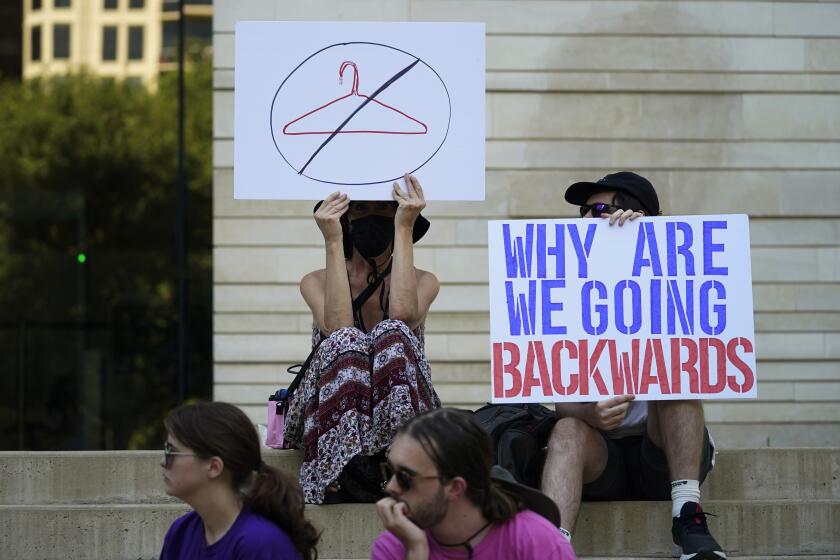House passes same-sex marriage bill in response to Supreme Court

- Share via
WASHINGTON — The U.S. House on Tuesday overwhelmingly approved legislation to protect same-sex and interracial marriages, amid concerns that the Supreme Court ruling overturning Roe vs. Wade’s guarantee of abortion access could jeopardize other rights criticized by conservative Americans.
The vote was 267 to 157, with dozens of Republicans joining Democrats for passage.
With a robust but lopsided debate, Democrats argued in favor of enshrining marriage equality into federal law, while Republicans steered clear of openly rejecting gay marriage. Instead, leading Republicans portrayed the bill as unnecessary amid other issues facing the nation.
Tuesday’s election-year roll call was partly political strategy, forcing all House members to go on the record with their views. It also reflected the legislative branch responding to concerns that the Supreme Court may revisit purportedly settled U.S. laws.
“For me, this is personal,” said Rep. Mondaire Jones (D-N.Y.), who is among the openly gay members of the House. “Imagine telling the next generation of Americans, my generation, we no longer have the right to marry. Congress can’t allow that to happen.”
Wary of political fallout, GOP leaders did not direct their lawmakers to hold the party line against the bill, aides said.
The Supreme Court’s decision to overturn Roe vs. Wade is causing some anxiety for people in same-sex marriages, particularly those with children.
But the Respect for Marriage Act, as the bill is known, is almost certain to fail in the evenly split Senate, where most Republicans will likely join a filibuster to block it. It’s one of several bills, including those enshrining abortion access, that Democrats are proposing to confront the court’s conservative majority. Another, guaranteeing access to contraceptive services, is set for a vote later this week.
Polling shows that a majority of Americans favor preserving rights to marry whom one wishes, regardless of gender, race or ethnicity. A Gallup poll in June showed broad and increasing support for same-sex marriage, with 70% of U.S. adults saying they think such unions should be recognized by law as valid. The poll showed majority support among both Democrats (83%) and Republicans (55%).
Approval of interracial marriage in the U.S. hit a six-decade high at 94% in September, according to Gallup.
With Roe vs. Wade now overturned, here is a breakdown of what California is doing to protect abortion rights.
“The extremist right-wing majority on the Supreme Court has put our country down a perilous path,” said Rep. Mary Gay Scanlon (D-Pa.) in a speech setting Tuesday’s process in motion. “It’s time for our colleagues across the aisle to stand up and be counted. Will they vote to protect these fundamental freedoms? Or will they vote to let states take those freedoms away?”
Republicans contended Tuesday that the court was focused only on abortion access when it struck down the Roe vs. Wade ruling and that same-sex marriage and other rights are not threatened. In fact, of all the Republicans who spoke during the morning debate, few directly broached the subject of same-sex or interracial marriage.
“We are here for a political charade; we are here for political messaging,” said Rep. Jim Jordan (R-Ohio).
As several Democrats spoke of inequalities they said they or loved ones had faced in same-sex marriages, Republicans talked about rising gas prices, inflation and crime, including recent threats to justices in connection with the abortion ruling.
For Republicans in Congress, the Trump-era confirmation of conservative justices to the Supreme Court fulfilled a long-term goal of reversing many social, environmental and regulatory rules the party has been unable to tackle by passing bills that could be signed into law.
Though it passed the House with Republican votes, the Respect for Marriage Act’s prospect in the Senate is unfavorable.
“I’m probably not inclined to support it,” said Sen. Josh Hawley (R-Mo.). “The predicate of this is just wrong. I don’t think the Supreme Court is going to overturn any of that stuff.”
In a notable silence, Senate Minority Leader Mitch McConnell of Kentucky declined to express his view on the bill, leaving open the question of how strongly his party would fight it if it comes up for a vote in the upper chamber.
“I don’t see anything behind this right now other than, you know, election-year politics,” said the GOP whip, Sen. John Thune of South Dakota.
The Respect for Marriage Act would repeal a law from the Clinton era that defines marriage as a union between a man and a woman. It would also provide legal protections for interracial marriages by prohibiting any state from denying out-of-state marriage licenses and benefits on the basis of sex, race, ethnicity or national origin.
The 1996 law, the Defense of Marriage Act, had essentially been sidelined by Obama-era court rulings, including Obergefell vs. Hodges, which established the rights of same-sex couples to marry nationwide.
But last month, writing for the majority in overturning Roe vs. Wade, Justice Samuel A. Alito Jr. argued for a more narrow interpretation of the rights guaranteed to Americans, saying that the right to an abortion was not spelled out in the Constitution.
Justice Clarence Thomas went further, saying in a concurring opinion that other rulings, including those pertaining to same-sex marriage and the right for couples to use contraception, should be reconsidered.
Losing the right to abortion was once unthinkable. Congress must act to to preempt the court from snatching away more rights through unthinkable decisions.
Although Alito said in the majority opinion that “this decision concerns the constitutional right to abortion and no other right,” many are concerned.
“The MAGA radicals that are taking over the Republican Party have made it abundantly clear they are not satisfied with repealing Roe,” said Senate Majority Leader Charles E. Schumer (D-N.Y.), referring to former President Trump’s supporters.
He pointed to comments from Sen. Ted Cruz (R-Texas), who said over the weekend that the high court’s Obergefell decision protecting marriage equality was “clearly wrong” and that state legislatures should visit the issue.
But Schumer didn’t commit to holding a vote on the bill.
Jim Obergefell, the plaintiff in the landmark ruling legalizing same-sex marriage, who is running as a Democrat for the Ohio House of Representatives, said after the court’s ruling on abortion, “When we lose one right that we have relied on and enjoyed, other rights are at risk.”
More to Read
Get the L.A. Times Politics newsletter
Deeply reported insights into legislation, politics and policy from Sacramento, Washington and beyond. In your inbox twice per week.
You may occasionally receive promotional content from the Los Angeles Times.













